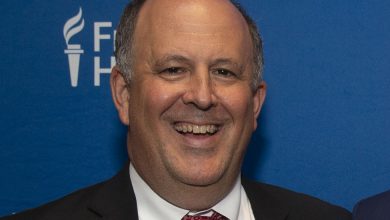The Chaos at OpenAI, Explained

If they had been the plot of a science fiction movie, or an episode of “Succession,” the events at OpenAI last weekend would have seemed a little over-the-top.
A secret board coup! Fears of killer A.I.! A star C.E.O., betrayed by his chief scientist! A middle-of-the-night staff revolt that threatens to change the balance of global tech power!
If you haven’t been paying attention to all the twists and turns in the saga, that’s OK. It’s been a confusing ride, with lots of complex jargon and hard-to-follow details.
But it’s an important story, even if you’re not particularly interested in A.I. If you’ve ever used ChatGPT or drawn a picture with DALL-E 3, or if you care about whether powerful A.I. systems might someday threaten human survival, all of that is wrapped up in the drama at OpenAI, the country’s most prominent maker of artificial intelligence.
Here’s what you need to know:
Why did this happen?
OpenAI’s board fired its chief executive, Sam Altman, in a surprise on Friday. The board’s explanation — that Altman had not been completely candid with them — was vague and opaque.
We still don’t know exactly what happened between Altman and the board. But OpenAI’s unusual governance structure — it is run by a nonprofit board that controls a for-profit subsidiary and can vote to replace its leaders — allowed the board to fire Altman without explaining itself.
What was the coup about?
The coup was led by Ilya Sutskever, OpenAI’s chief scientist, who had butted heads with Altman. Sutskever wants the company to prioritize safety and was worried that Altman was more focused on growth.
Sutskever is among a faction of A.I. experts who are fearful that A.I. may soon surpass human abilities and become a threat to our survival. Several of OpenAI’s board members have ties to effective altruism, a philosophical movement that has made preventing these threats a top priority. Altman has concerns about A.I. risks, too. But he has also expressed optimism that A.I. will be good for society, and a desire to make progress more quickly. That may have put him at odds with the safety-minded board members, whose job is to see that powerful A.I. is developed responsibly.
What’s happened since the coup?
Over the weekend, it looked as though Altman might return to OpenAI, under the condition that major changes were made to the board. That didn’t happen. Instead, late on Sunday night, the board affirmed its decision, writing in a memo to employees that Altman’s “behavior and lack of transparency in his interactions with the board undermined the board’s ability to effectively supervise the company in the manner it was mandated to do.”
The board then appointed Emmett Shear — the former chief executive of Twitch, a livestreaming company — to be OpenAI’s second interim C.E.O. in just a few days. (Mira Murati, the chief technology officer, had been given the job, only to lose it after signaling her support for Altman.)
In response, Microsoft — OpenAI’s biggest investor and a major strategic partner — offered to give Altman and his top lieutenant, Greg Brockman, a job running a new A.I. lab. Nearly all of OpenAI’s roughly 770 employees signed a letter threatening to quit and go work for the new Microsoft team, unless the start-up’s board resigned and brought back Altman and Brockman.
In another surprise twist, Sutskever then had second thoughts. He wrote in a post on X on Monday that he deeply regretted having taken part in the ouster and that he had “never intended to harm OpenAI.” He also signed the letter pledging to follow Altman and Brockman to Microsoft unless the board reversed its decision.
That sounds messy! But why does this matter to the rest of us?
Corporate infighting is not new. But what makes the OpenAI story stand out is the stakes. OpenAI is no ordinary company. It built ChatGPT, one of the fastest-growing tech products of all time, and it employs many of the top A.I. researchers.
The company is also unusually ambitious and saw its role as building a digital superintelligence that would eventually become more powerful than humans. In addition, Altman was a well-liked leader and a figurehead for the A.I. industry, making the board’s decision to oust him even more of a mystery.
In a larger sense, what’s happening at OpenAI is a proxy for one of the biggest fights in the global economy today: how to control increasingly powerful A.I. tools, and whether large companies can be trusted to develop them responsibly.
More on OpenAI
-
On the “Hard Fork” podcast, Kevin interviewed Altman about the future of A.I. shortly before he was fired.
-
The saga over the leadership of OpenAI has deepened the parallels between Altman and Steve Jobs, who quit Apple in 1985 after its board marginalized him.
THE LATEST NEWS
Israel-Hamas War
-
Even as negotiators work to free hostages in Gaza, Hamas has given no public updates about their condition, leaving their families desperate.
-
Many of the Israelis abducted by Hamas on Oct. 7 had serious medical problems or were badly injured in the attack. Doctors say they need care urgently.
-
An attack on a northern Gaza hospital killed at least 12 people, the Gaza health ministry said. Israel said its troops had been attacked from within the hospital.
-
None of Gaza’s 36 hospitals are functional enough to treat critical trauma cases or perform surgery, according to the World Health Organization.
-
Aid workers transported 28 premature babies who were in intensive care at Al-Shifa Hospital to Egypt for treatment, the U.N. said. Here’s an account of giving birth in Gaza during Israel’s siege.
-
The two sides’ narratives of the conflict diverge, leaving little room for mutual empathy, Roger Cohen writes.
-
Planes are losing satellite signals and flights have been diverted because of electronic warfare tactics in the Middle East and Ukraine.
-
The Oslo peace process could have settled the Israeli-Palestinian conflict decades ago. The reasons it failed — violence, extremism and weak leaders — help clarify today’s fighting. A Times Magazine article explains.
Politics
-
A federal court effectively blocked civil rights groups from suing under the Voting Rights Act, which would weaken the law. The plaintiffs are likely to appeal the ruling.
-
“Vermin,” “sick”: Donald Trump’s verbal attacks on his political opponents are alarming autocracy experts.
-
Americans are angry about more than just inflation. Those broader frustrations, more than their own financial situations, may be driving their unhappiness with the economy.
-
President Biden pardoned two turkeys — Liberty and Bell — and joked about his age. “This is the 76th anniversary of this event. And I want you to know I wasn’t there for the first one.”
War in Ukraine
-
The trauma and uncertainty of conflict is causing regressions in the development of Ukrainian children with special needs.
-
Little territory is changing hands in the war. As casualties increase, for Ukrainian soldiers and medics the conflict is anything but static.
-
Lloyd Austin, the defense secretary, visited Kyiv as concerns grow about American aid. “The United States will continue to stand with Ukraine in their fight for freedom,” he said.
Tech
-
Carbon-free electricity — from wind, solar and hydroelectric sources — has never been more plentiful. But the use fossil fuels is still rising globally, as these charts show.
-
Self-driving taxis have slowed emergency response times in San Francisco and Austin, local officials say.
-
“A legal issue and an ethical issue”: The U.S. and a handful of other nations are developing lethal A.I.-controlled drones that could reshape warfare.
-
X sued the advocacy organization Media Matters for publishing research that showed ads on the platform appeared next to antisemitic content. X rejected the group’s findings.
Migration
-
“It is not an easy system to navigate”: The Times spoke to five migrants in New York City about how they seek shelter, earn money and are trying avoid deportation.
-
Two million migrants in the U.S. are waiting for decisions on their asylum applications. Fewer than 1,500 officials can rule on the claims.
Other Big Stories
-
An evolutionary marvel: The Omicron variant of Covid has given rise to an impressive number of immunity-evading descendants.
-
Hundreds of people, including a former lawmaker, were sentenced to prison in a trial that prosecutors said dealt a crucial blow to the Mafia in southern Italy.
-
The A.C.L.U. called on a Kansas school to review its dress code after an 8-year-old Native American boy who grew his hair out to reflect his heritage was made to get a haircut.
Opinions
The Federalist Society no longer supports the rule of law, and young lawyers need a conservative movement that will, George Conway, J. Michael Luttig and Barbara Comstock write.
As Brexit divides Northern Ireland from the rest of the U.K., the dream of Irish reunification has become more realistic, Megan Stack writes.
Here are columns by Michelle Goldberg on antisemitism and Zeynep Tufekci on Apple and Google.
MORNING READS
Trendsetter: Rosalynn Carter did not play the White House dress-up game as designed by the likes of Jackie Kennedy, but she understood the power and the political use of clothes.
Travel deals: Bargain shoppers can find Black Friday discounts on hotels, tours and cruises.
Bedtime sniffles: It’s not just you — people really do cough more at night. We asked experts to explain.
Lives Lived: The novelist Herbert Gold emerged after World War II as a promising young writer who explored the complexities of love, marriage and Jewish identity. He died at 99.
SPORTS
N.F.L.: The Philadelphia Eagles defeated the Kansas City Chiefs, 21-17, in a Super Bowl rematch, cementing their place atop the league.
Soccer: The U.S. men’s national team qualified for the Copa América, despite a 2-1 loss to Trinidad and Tobago.
N.B.A.: The New York Knicks argued their dispute with the Toronto Raptors over scouting reports and video files should stay in federal court and not be moved to league-run arbitration.
ARTS AND IDEAS
Making room: The composer Julia Perry achieved significant success during the 1950s and ’60s. She earned two fellowships from the Guggenheim Foundation and European audiences embraced her. Yet Perry’s career later fell into obscurity. She died in 1979 with only a few published works.
This week, her 1951 “Stabat Mater” is part of the The New York Philharmonic’s program. “Programming Julia Perry is about making room,” said J’Nai Bridges, a mezzo-soprano who will make her Philharmonic debut during the performance. “Not just to tick boxes, but because we want to continue performing beautiful music.”
More on culture
-
The Guggenheim has appointed Mariët Westermann, the vice chancellor of N.Y.U. Abu Dhabi, as its director and chief executive. She will be its first female director.
-
David Letterman finally returned to “The Late Show” on CBS, which he hosted for 22 years, as a guest.
THANKSGIVING PREP LIST
Prep vegetables like carrots, green beans, brussels sprouts and butternut squash. Toast nuts. Leave out torn bread cubes for one of our best stuffing recipes.
THE MORNING RECOMMENDS …
Cozy up with this winter squash and wild mushroom curry.
Avoid family drama this holiday season.
Buy your loved ones a gift that will last forever (or extremely close).
Explore early Black Friday deals.
GAMES
Here is today’s Spelling Bee. Yesterday’s pangram was graphic.
And here are today’s Mini Crossword, Wordle, Sudoku and Connections.
Thanks for spending part of your morning with The Times. See you tomorrow.
. Reach our team at [email protected].



